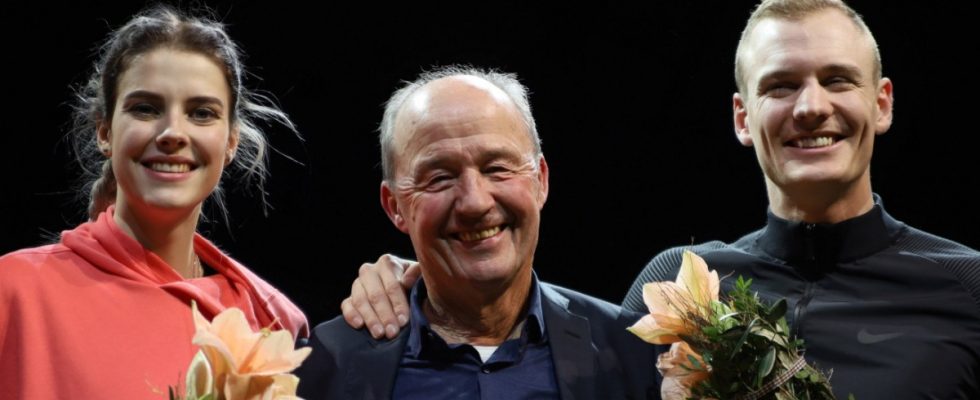The guest list that recently came together in Cottbus for the outgoing meeting director Ulrich Hobeck, 76, once again spoke for itself: Björn Otto was there, as was the German pole vault record holder and 20-time starter in Cottbus, Rudi Thiel, 95 years old , long-time organizer of the Berlin Istaf stadium festival, long jump Olympic champion Heike Drechsler. The presents included flowers, signed spikes and another record: high jump world champion Jaroslawa Mahutschich from Ukraine replaced Olympic champion Maria Lassizkene from Russia as meeting record holder with 2.04 meters.
However, the sports festival was not entirely without minor tones. Because the 20th edition of the Cottbus Springer event was the last for the time being, Hobeck’s departure could mean the end of a decades-long meeting culture in Lusatia. And on a small scale, this also represents the problems that continue to concern German athletics on a larger scale.
The story behind it begins on a black cinder track that steeplechaser Ulrich Hobeck entered as an outsider at the European Cup in Stockholm in 1970. It was the best race of his career, Hobeck stormed into second place behind the Soviet Russian world record holder Vladimir Dudin – and contributed to the GDR breaking through the dominance of the USSR for the first time and also defeating the West German team. In addition to the side effects of the time, the race was also a duel of material: the favored West German Rolf Burscheid, who competed for the first time in the shoes with the three stripes, lost his shoe, which had been provided with holes at the front and back to promote water drainage, and came last, barefoot. Hobeck’s shoes from the GDR brand Zeha proved to be significantly more robust.
Because he had contact with an English journalist, he had to end his career
Nevertheless, it was a bitter blow for him shortly afterwards. Because of contacts with an English journalist, Hobeck, the 13-time GDR champion, was taken out of circulation by sports policy officials. He still feels the sting today: “It destroyed my sporting career.” He missed the 1972 Olympic Games in Munich. “I just cried,” he remembers.
Because he threatened to tell his story in a major West German tabloid, he was hired as a teacher, says Hobeck. As a qualified sports teacher, he looked after various talents on their way to the top and became club president. He still sees his commitment as a defiant reaction to the discipline imposed by the former GDR leadership. He later organized 22 stadium meetings in Cottbus, together with Heinz-Florian Oertel, the former voice of GDR sports reporters; The jumpers’ meeting took place in the hall for the first time in 2003.
Hobeck and his team mastered the basics perfectly – a stage that was not too small but not too big, an expert audience, smooth organization – at the same time they tried to constantly bring new impulses to the presentation of athletics. At the jumpers’ meeting, he focused early on on two disciplines and a few athletes who would otherwise quickly disappear in the colorful stadium athletics fair. Hobeck organized a total of 42 meetings under the motto: “We Ossis can do it too.” He meant: professional sport after the times of state sport.
For a city that doesn’t normally offer so many national sporting events, it was something special when the athletics elite came to Lausitz year after year. In 2009, Hobeck was voted Cottbuser of the Year, and Federal President Horst Köhler honored him for his commitment to volunteer work. At the same time, Hobeck sensed early on how difficult it was to get the audience, sponsors and, above all, television excited about his sport, which is also why the stadium festival in Cottbus took place for the last time in 2011. And for his job as head of the spring meeting (“a year-round job”), no successor was found until recently, not even in his 40-strong, mostly volunteer organizational team – although they had been looking for years, says Hobeck.
“I’m worried about German athletics and the association”
Hobeck is also thoughtful in other ways at the end of his long career. “I’m worried about German athletics and the association,” he says: “The foundation, the development, the motivation and also the leadership are not enough to advance our sport. New approaches are needed.” From 2002 to 2017 he was head of the German Meetings association, which tried to pursue just such paths in Germany until it was dissolved. Hobeck would probably not necessarily claim that the German Athletics Association is now filling this gap profitably.
His departure hurts the umbrella organization either way. Hobeck, said DLV Vice President Hartmut Grothkopp now in Cottbus, is “the most successful German meeting organizer of our time”. Someone who leaves with a clear conscience in any case. However, he will remain President of LC Cottbus for the time being. It’s not possible without athletics.

